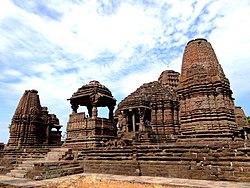Top Qs
Timeline
Chat
Perspective
Sinnar
Town in Maharashtra, India From Wikipedia, the free encyclopedia
Remove ads
Sinnar (Pronunciation: [sinːəɾ]) is a city and a municipal council in Sinnar taluka of Nashik district in the Indian state of Maharashtra. Sinnar is the third largest city in Nashik district after Nashik and Malegaon.
Remove ads
History
According to local tradition, Sinnar was founded by the Gavli chieftain Rav Singuni,[1] and his son Rav Govinda built the temple of Gondeshwara at a cost of 2 lakh rupees.[2]
Modern historians identify Sinnar with Seuna-pura, a town established by the Seuna (Yadava) king Seuna-chandra.[3] At its peak, the Yadava dynasty (850 - 1334) ruled a kingdom stretching from the Tungabhadra to the Narmada Rivers, including present-day Maharashtra, north Karnataka and parts of Madhya Pradesh. Their later capital was at Devagiri, now known as Daulatabad in Maharashtra.
Remove ads
Geography

Sinnar is located at 19.85°N 74.0°E.[4] It has an average elevation of 651.4 metres (2135 feet). Sinnar is one of the major industrial zones of Malegaon (MIDC) built around the city of Nashik which have multiple international production companies. It lies 30 km southeast of Nashik city on the Pune - Nashik Highway.
Demographics
As of 2001[update] India census,[5] Sinnar had a population of 65,299. Males constitute 52% of the population and females 48%. Sinnar has an average literacy rate of 71%, higher than the national average of 59.5%: male literacy is 77%, and female literacy is 64%. In Sinnar, 15% of the population is under 6 years of age.
Culture
The Gondeshwar Temple, an 11th-12th century temple dedicated to Shiva, is located in Sinnar.
The Gargoti Museum houses a collection of mineral specimens native to the region.
References
Wikiwand - on
Seamless Wikipedia browsing. On steroids.
Remove ads


